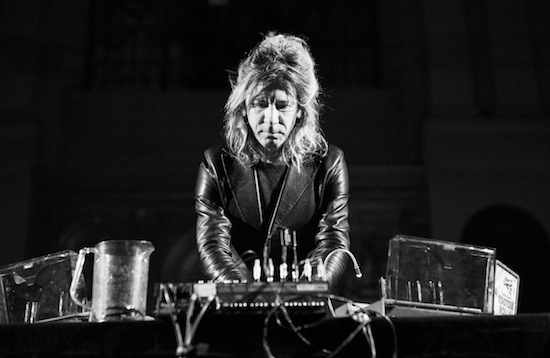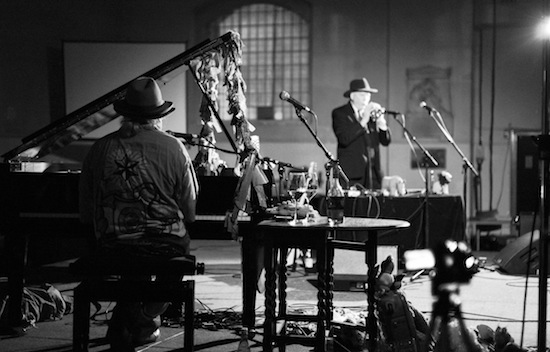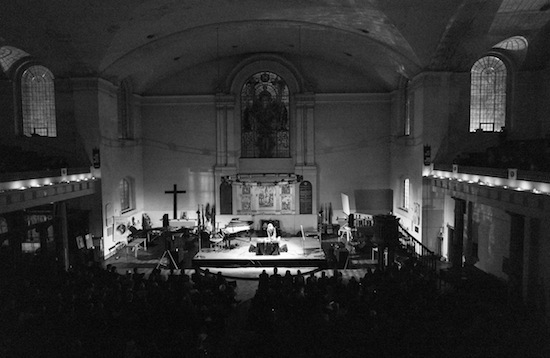"It’s not repetition, it’s discipline." This quote from Mark E Smith springs to mind during the recent performance from William Basinski, Rhys Chatham and Charlemagne Palestine at the St John’s Sessions, Hackney. Repetition and minimalism are quite obvious bedmates; however, throughout the performances from Basinki (first and solo) and Palestine/Chatham (second and duo), their different – yet formally comparable – tonal circularity takes on an air of the transcendental. So, beyond repetition, it’s probably also necessary to throw the word ritual into the mix, particularly in relation to Basinki’s opening performance – a section from his 2009 album Vivian & Ondine – and Palestine’s contribution to the second performance, one of his first with Chatham since their 1974 collaboration (along with Terry Jennings, Tony Conrad and Robert Feldman) on Sharing A Sonority.
During Basinski’s performance the previous week, before Michael Gira’s Arcadia slot, I struggled to enter his realm of disintegration. Yet there was a simple reason: I was seated too far away. Minimalist musical practice is often (though not always) about shrouding the process and presenting the polished object in its final sparse totality. That’s not the way Basinki should be experienced: his process of disintegration is reliant on construction and destruction, never finality/totality/immovability.
Tonight, I secure a seat in St John’s upper tier – near to the stage – so as to be able to almost look directly down on him. Setting his two reel-to-reel tape decks in motion is a delicate and intricate process that completely passed me by a week ago. First left, then right, are set off. The mix is pushed up imperceptibly. A smothered, slow orchestral score sits towards the back, punctuated by what sounds like the occasional blows of rock-on-rock in a cavernous yet insular space. Discarding the left loop, Basinski places it in a glass jar before extracting another from a small metal tin. Digitally looping the initial tape then allows him to proceed with layering up the sounds. They collapse in on one another, each variously cutting across, complementing and accentuating its predecessor. Finally, he reins the mix in, reducing it to near silence, letting it hang almost inaudibly. Holding the tin aloft, he indicates the importance of his disintegrated objects.

Palestine enters and immediately makes his mark, draping the grand piano that has sat idle on stage in a colourful stream of interwoven fabrics. Palestine’s visible aesthetic is antithetical to preconceptions of minimalism: bright vivid clothing, stuffed animals crowded on the stage, and fabric strewn on the floor. Where much minimalist practice is erroneously reliant on a pared-down outward projection to gain sparse/serious kudos points, Palestine couldn’t care less – he is all about ritual. He and Chatham busily pace the stage, discussing stuffed animal arrangements, swapping out fabrics and occasionally glancing/pointing to the upper tier. The reason for their interest in the higher seats slowly becomes clear as the performance begin. The stage is set, yet Chatham and Palestine have apparently departed. Then, next to the large organ on the upper tier, comes a singular hymn-like chant. Trained originally as a cantor, Palestine is stood producing a mesmerising vocal tone while holding a single note on the mammoth church organ. Chatham, next to him, interjects and circulates around the chant on a flute. Returning to the stage, continuing the chant all the while (and making great sonic use of the stairwell space from top to bottom), Palestine begins a two-note ascension on the grand piano, akin to his renowned Strumming Music piece.

Chatham, on an array of brass instruments, uses live looping to variously match and bump against the grand soundscape of the piano. Leaving these tones unfurling, Chatham then switches to electric guitar. He thrashes away in near silence as some lengthy delay beautifully pins back his cutting chords. So they proceed, building up and up, before Palestine offers a full-blown interlude on the church organ. It brings Chatham to his knees, as if in prayer.


